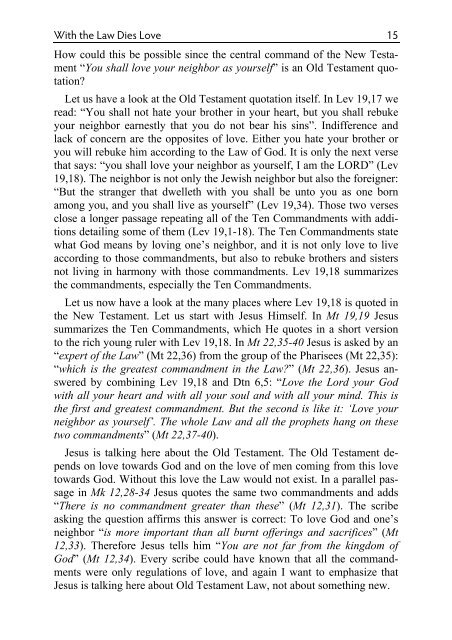Love is the Fulfillment of Law - World Evangelical Alliance
Love is the Fulfillment of Law - World Evangelical Alliance
Love is the Fulfillment of Law - World Evangelical Alliance
Create successful ePaper yourself
Turn your PDF publications into a flip-book with our unique Google optimized e-Paper software.
With <strong>the</strong> <strong>Law</strong> Dies <strong>Love</strong> 15<br />
How could th<strong>is</strong> be possible since <strong>the</strong> central command <strong>of</strong> <strong>the</strong> New Testament<br />
“You shall love your neighbor as yourself” <strong>is</strong> an Old Testament quotation?<br />
Let us have a look at <strong>the</strong> Old Testament quotation itself. In Lev 19,17 we<br />
read: “You shall not hate your bro<strong>the</strong>r in your heart, but you shall rebuke<br />
your neighbor earnestly that you do not bear h<strong>is</strong> sins”. Indifference and<br />
lack <strong>of</strong> concern are <strong>the</strong> opposites <strong>of</strong> love. Ei<strong>the</strong>r you hate your bro<strong>the</strong>r or<br />
you will rebuke him according to <strong>the</strong> <strong>Law</strong> <strong>of</strong> God. It <strong>is</strong> only <strong>the</strong> next verse<br />
that says: “you shall love your neighbor as yourself, I am <strong>the</strong> LORD” (Lev<br />
19,18). The neighbor <strong>is</strong> not only <strong>the</strong> Jew<strong>is</strong>h neighbor but also <strong>the</strong> foreigner:<br />
“But <strong>the</strong> stranger that dwelleth with you shall be unto you as one born<br />
among you, and you shall live as yourself” (Lev 19,34). Those two verses<br />
close a longer passage repeating all <strong>of</strong> <strong>the</strong> Ten Commandments with additions<br />
detailing some <strong>of</strong> <strong>the</strong>m (Lev 19,1-18). The Ten Commandments state<br />
what God means by loving one’s neighbor, and it <strong>is</strong> not only love to live<br />
according to those commandments, but also to rebuke bro<strong>the</strong>rs and s<strong>is</strong>ters<br />
not living in harmony with those commandments. Lev 19,18 summarizes<br />
<strong>the</strong> commandments, especially <strong>the</strong> Ten Commandments.<br />
Let us now have a look at <strong>the</strong> many places where Lev 19,18 <strong>is</strong> quoted in<br />
<strong>the</strong> New Testament. Let us start with Jesus Himself. In Mt 19,19 Jesus<br />
summarizes <strong>the</strong> Ten Commandments, which He quotes in a short version<br />
to <strong>the</strong> rich young ruler with Lev 19,18. In Mt 22,35-40 Jesus <strong>is</strong> asked by an<br />
“expert <strong>of</strong> <strong>the</strong> <strong>Law</strong>” (Mt 22,36) from <strong>the</strong> group <strong>of</strong> <strong>the</strong> Phar<strong>is</strong>ees (Mt 22,35):<br />
“which <strong>is</strong> <strong>the</strong> greatest commandment in <strong>the</strong> <strong>Law</strong>?” (Mt 22,36). Jesus answered<br />
by combining Lev 19,18 and Dtn 6,5: “<strong>Love</strong> <strong>the</strong> Lord your God<br />
with all your heart and with all your soul and with all your mind. Th<strong>is</strong> <strong>is</strong><br />
<strong>the</strong> first and greatest commandment. But <strong>the</strong> second <strong>is</strong> like it: ‘<strong>Love</strong> your<br />
neighbor as yourself’. The whole <strong>Law</strong> and all <strong>the</strong> prophets hang on <strong>the</strong>se<br />
two commandments” (Mt 22,37-40).<br />
Jesus <strong>is</strong> talking here about <strong>the</strong> Old Testament. The Old Testament depends<br />
on love towards God and on <strong>the</strong> love <strong>of</strong> men coming from th<strong>is</strong> love<br />
towards God. Without th<strong>is</strong> love <strong>the</strong> <strong>Law</strong> would not ex<strong>is</strong>t. In a parallel passage<br />
in Mk 12,28-34 Jesus quotes <strong>the</strong> same two commandments and adds<br />
“There <strong>is</strong> no commandment greater than <strong>the</strong>se” (Mt 12,31). The scribe<br />
asking <strong>the</strong> question affirms th<strong>is</strong> answer <strong>is</strong> correct: To love God and one’s<br />
neighbor “<strong>is</strong> more important than all burnt <strong>of</strong>ferings and sacrifices” (Mt<br />
12,33). Therefore Jesus tells him “You are not far from <strong>the</strong> kingdom <strong>of</strong><br />
God” (Mt 12,34). Every scribe could have known that all <strong>the</strong> commandments<br />
were only regulations <strong>of</strong> love, and again I want to emphasize that<br />
Jesus <strong>is</strong> talking here about Old Testament <strong>Law</strong>, not about something new.

















